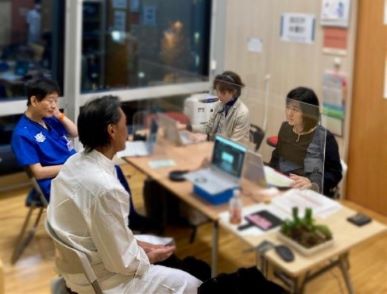April, 2022
In February 2022, the PR Department in Eisai Headquarters hosted an online lecture by a patient with insomnia and his doctor, Dr. Toshihiko Shimizu, Visiting Professor of Neurosurgery at Tokyo Women’s Medical University, as part of hhc activity.
The patient, who runs a company and is in his 50s, a prime working age, candidly shared his story of how he became insomniac as well as his thoughts and feelings leading up to his visit to the doctor and receiving medication. He had a full and busy work schedule, and the stress of his work gradually led to insomnia. However, even though he knew he had insomnia, he felt great resistance to taking the step of seeing a medical professional because of the negative image he had of “insomnia”. He told us that he later met his current doctor, Dr. Shimizu, whom he trusts, and is now better able to deal with his insomnia than before.
It was heartbreaking to learn from what the patient and Dr. Shimizu told us that, for the patient with insomnia, there was not only the pain of insomnia itself, but also feeling resistance to “visiting a psychiatrist or psychosomatic medicine” and “taking sleeping pills,” as well as concerns such as “difficulty in talking to others about the problem”. We also learned that, with proper medication, patients can get good quality sleep, which allows them to live and work more fully.
We have come to realize that we need to disseminate information which can dispel the negative image of insomnia itself in order to relieve the anxiety of patients.

Eisai held the online lecture with a thorough infection control program. Only the patient, doctor, and organizers (Eisai employees) attended in person. PR Department staff members other than the organizers and approximately 20 employees involved in R&D in the neurological field participated in via online.
We, as Eisai employees who participated in, were able to realize that we had become more aware of our own daily work and our motivation had improved, through this lecture. We also determined to aim for business activities that more deeply incorporate the perspectives of patients. The followings are some of our impressions gained from participating in the lecture.
-
- Knowing that the current practice of treating insomnia in the department of psychiatry has led to delays in the process of seeing a psychiatrist because of the hesitancy of patients to see a psychiatrist, I thought of many undiagnosed people who suffer from insomnia. Since insomnia has long been a disease for which a cure has existed, I assumed that there would be almost no barriers for patients to see a doctor. Now, however, I realized the need of transformation with digital technology and remote medical care to address the accessibility issues that still exist today.
- Having heard the words of the patient who had the problem of not being able to sleep, but “didn't know where to consult,” “didn't feel comfortable going to the hospital,” and “had a scary image of sleeping pills,” and also learned about the real experiences of him who took years before he started going to the hospital, I came to realize that those are real concerns common to the patients with insomnia.
- I was reminded, once again, that it is the responsibility of pharmaceutical companies to carefully provide information about the safety and effectiveness of drugs and access to medical care for patients with a variety of concerns and needs.
- I was impressed by the fact that the doctor also deeply understands the patient’s personality and background when treating insomnia.
- I was new to the background that causes insomnia, i.e. high basal neural activity, that the doctor explained to us. I would like to create a future in which patients can select appropriate therapeutic agents using biomarkers such as electroencephalography, while deepening our understanding of the differences in biology and the background of insomnia in individual patients, even if they suffer from the same insomnia disorder.
- Japanese people tend to have shorter average sleep durations than those in Europe, the U.S. and other countries. In addition, it is said that many Japanese people rely on nighttime drinking to fall asleep, while few Japanese people rely on medication for insomnia. I thought that we could help as many patients as possible by improving the image associated with insomnia and medication and by educating people about the importance of sleep.
